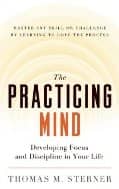Your mind is your strongest tool in the journey to weight loss.
Based on the book The Practicing Mind: Developing Focus and Discipline in Your Life , (c) 2012 by Thomas M. Sterner. Printed with permission from New World Library.
What’s the first thing we do when we set a dieting goal? We aim at the final destination: “I want to lose 25 pounds.” This immediately sets up a perspective that breeds struggle and beckons failure before we have made that first step onto the treadmill or passed up that first donut. Why?
Most of us have a habit of setting our goals too far out in front of where we are at that moment and immediately become attached to the point in time when that goal will be reached. This is both counterproductive and a misuse of the goal. Instead of our goal serving as a rudder to guide our effort, it creates a feeling within us that every moment along the way to reaching that goal is something we have to overcome, something we must endure. We experience impatience and struggle, and if we fail to sustain our extended effort, we can lose confidence in our ability to reach any particular goal we set. We also usually attach a time frame for reaching our goals that is totally unrealistic and not based on any factual information, but instead is driven by the thought that reaching a particular goal will make us feel more complete than we already are.
The key is to break our final goal into more manageable parts. Losing 25 pounds is the end of the journey, but to keep us inspired, it is much more helpful to set a goal of first losing only 5 pounds. Instead of feeling overwhelmed, or even fearful, that we will not be able to overcome our cravings for certain foods on any given day or, worse, for an entire week, we should focus on just breakfast and then just the midmorning snack. We know the rest of the day is out there, but we accept that we are here now and that there is just this one meal, this one temptation to deal with. We see only the physical exercise we need to do today, not the cumulative effort it will take to integrate exercise into our schedule for the rest of our lives.
We focus only on one small, simple task as we move through each hour of each day. Doing this requires the same awareness and control of eating and exercise that we need to reach the final goal of losing 25 pounds, but it sets us up with a much shorter “cycle of dieting” that we must adhere to before experiencing success. That experience of success then breeds the motivation and stamina necessary to keep moving forward.
It’s also wise to limit your number of trips to the scale. Stepping on the scale more than once or twice a week can be counterproductive because it can strengthen your attachment to reaching your overall weight goal as opposed to the process of achieving the weight loss. In systems such as Weight Watchers you only have one weigh-in a week. It is normal for your weight to fluctuate a little day-to-day, and stepping on the scale every day when you are trying to lose weight is like constantly looking at your hair in the mirror after a bad haircut to see if it has grown out. What you are really doing is measuring the distance from where you are to where you feel you want to end up. At some level you are saying, “I am not where I want to be, and until I get there, I am incomplete and so can’t feel good about where I am right now.”
The hidden joy in losing weight is a basic truth that is present in any cycle of creating a goal, working toward it, and then eventually reaching it. That joy is revealed in the awareness that the “moment” of achieving your goal is happening in every moment of your effort. In that awareness, you are open to accept those positive emotions in real time because you become aware that you are “living your success” right now.

Thomas M. Sterner is the author of The Practicing Mind: Developing Focus and Discipline in Your Life. Visit him online at www.thepracticingmind.com.
Read more: http://www.beliefnet.com/Health/Weight-Loss/Dieting-with-a-Practicing-Mind.aspx#ixzz1tr9tRcFA

No comments:
Post a Comment